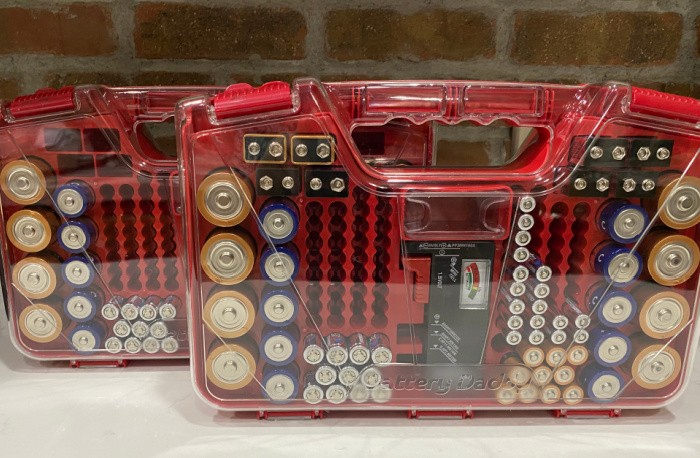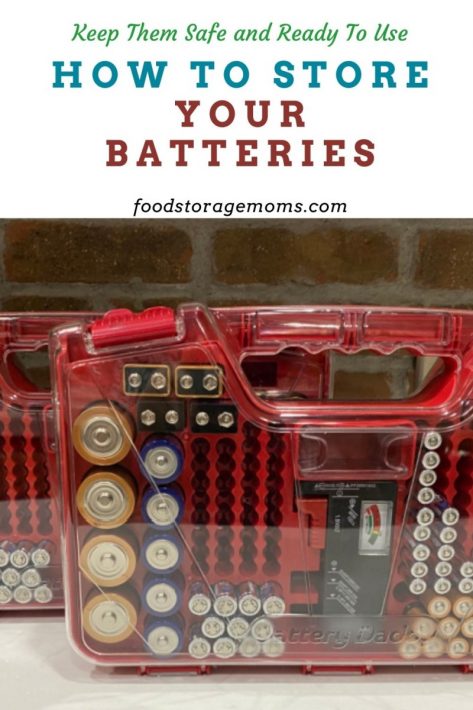
We struggle to keep a supply of batteries ready to go to work when needed. When Mark and I visit stores like Home Depot and Costco, we see racks with battery packages, which shows that you can often save money if you buy in bulk.
Our challenge is knowing how to store batteries to take advantage of the bulk sales while keeping them as fresh as possible. Harry gifted me some batteries a few years ago because I couldn’t get C and D batteries. They were shipped from Sam’s Club. I only buy Sam’s Club batteries now.
If we try to simplify battery storage, others will probably face the same dilemma. I decided to research and learn as much as possible to share the information in this post.
I could expand my research and try to cover things like car, boat, and camper batteries, but I decided to focus on the small batteries we use in our flashlights, smoke alarms, clocks, calculators, and more.
Let’s get started in our efforts to learn how to store batteries. The information order isn’t as important as the content, so I hope you can easily follow along.
In case you missed this post: 100 Items That Will Disappear After An Emergency
How To Store Your Batteries

Try to Keep the Batteries You Buy in the Original Sealed Package
Batteries typically come in those “hard to open” packages that usually require scissors. They are sealed that way so moisture (humidity) can’t access the batteries until it’s time to use them. Once opened, they MAY begin to lose some charge, but generally, that’s a relatively slow process unless the humidity level is high.
Another reason to keep them in their original packaging is to maintain the integrity of new batteries compared to old batteries you may have around. What you don’t want to do is mix older ones with those you’ve just opened.
As a backup plan, when you don’t save the original package, please place them in a plastic container. If you have good-quality containers, they should be somewhat airtight. Plastic is preferred to metal containers since the metal can interact with the batteries and cause a discharge.
When you put them in the plastic container, place them side by side with the positive conductor end toward the edge of the container. You may want to put tape on the ends of the next row or consider separating the rows with a small piece of cardboard so the ends don’t touch.
I opted to buy this Battery Storage Unit
Topaz mentioned she likes this wall-hanging Battery Storage Unit
Batteries Should be Stored by Type, Manufacturer, and Age
As we all know, household batteries come in many shapes and sizes with designations of AAA, AA, A, C, D, etc. Of course, AAA batteries are smaller and are used in devices with a minimal power requirement, and so on.
The best choice is to store batteries by their type/size. It is also suggested that you don’t mix and match manufacturers since they may tend to interact with each other for some reason.
I read that if you have limited storage container space, be sure to separate the batteries in the container by carefully placing the type and manufacturer in a plastic bag or using the cardboard separators mentioned earlier.
As mentioned above, don’t mix your used or older batteries with new ones. There is nothing more frustrating than taking the time to change out a worn-out battery with the one you think is new and fully charged, only to have it fail in a short timeframe and have to change it again.
That is particularly true when changing smoke alarm batteries, which require you to get a ladder out of the garage to accomplish the task.
Try to Keep the Storage Temperature at “Room Temperature” or Lower
There is an old wives’ tale or myth that storing batteries in the refrigerator or freezer will either bring them back to life or significantly extend their life. That really isn’t the case. For long-term storage, it is best to keep the batteries in a place that you find comfortable.
When stored at about 77°F/25°C (which I find to be a bit too warm for me), they will lose very little charge. A temperature of 34°F/1°C to 60°F/15°C MAY show a very minor benefit when it comes to storage life, but the risk from moisture/water damage is too high.
Some manufacturers suggest putting the batteries in the freezer, but that is certainly the exception. There is also the issue of allowing the battery to warm up before use or preventing it from working correctly.
Humidity Control is Critical
Having lived in the Western states most of my life, I haven’t had to deal with humid environments. I remember Mark and me visiting Sanibel Island off the west coast of Florida with family one Thanksgiving.
We’d been to Florida on trips before and hadn’t been bothered much, other than a trip in late September to Disney World. Boy, that 90°F/32°C and 95% humidity was brutal! Anyway, after the Sanibel Island trip, we never could get the musty smell from our luggage.
Most batteries don’t like humidity. For some reason, Alkaline batteries seem to do better than others if the humidity is moderate, but most will last longer and perform better in drier environments. Also, it’s suggested that batteries be kept up off the ground.
Keep the Stored Batteries Away from Metal of All Kinds
Metal conducts electricity better than most materials, including water. Your batteries could begin losing their charge if stored anywhere they can come in contact with metal, including metal containers and any container with other metal items like coins or wire.
As mentioned, store the batteries in plastic containers, don’t let the positive and negative ends touch each other, and consider separating them with cardboard or masking tape.
What are Some Safety Considerations When Storing Batteries?
There are various safety issues when it comes to storing and using household batteries, as follows:
If the device using the batteries is going to be taken out of service for any long-term period, remove the battery. When not in use, batteries often begin to leak, which could cause significant damage to the device.
That also applies to batteries that have lost their charge and stopped working. Immediately remove them and dispose of them properly.
Don’t expose devices and their batteries to very warm or hot environments. This includes leaving your laptop in your car or on a window sill for extended periods.
The heat can damage the battery and related devices, which could prove very expensive to replace. Batteries have been known to explode if kept hot for very long, which is not a pleasant or safe situation.
Be sure to keep your children away from batteries. Not only are the batteries’ contents unsafe, but the small coin-shaped batteries could cause the little ones to choke if they are taken into the mouth.
You may be tempted to try to recharge regular batteries, but it won’t work and could prove dangerous. Also, if they are rechargeable, be sure to use the charging unit designed for that size and type of battery.
Most small batteries can be disposed of in your trash. Check local regulations and follow them.
If told to recycle, ask if there are size exemptions and where the batteries should be taken if recycling is required.
Final Word
Hey, we all use battery-powered devices every day. We may even use some but don’t realize a battery drives its use. Learning how to store batteries has helped me, and I hope you found the information helpful.
Let’s all work together to make the world more efficient and safe. May God bless this world. Linda
The post How To Store Your Batteries appeared first on Food Storage Moms.
from Food Storage Moms
No comments:
Post a Comment